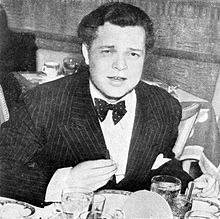The Campbell Playhouse (radio)

Orson Welles (July 1938)
|
|
| Genre | Anthology drama |
|---|---|
| Running time | 60 minutes |
| Country | United States |
| Language(s) | English |
| Home station | CBS |
| Hosted by | Orson Welles |
| Starring |
|
| Written by |
|
| Directed by |
|
| Produced by |
|
| Executive producer(s) | Davidson Taylor (for CBS) |
| Air dates | December 9, 1938 to March 31, 1940 |
| No. of series | 2 |
| No. of episodes | 56 |
| Audio format | Monaural sound |
| Opening theme | Piano Concerto No. 1 in B-Flat Minor |
The Campbell Playhouse (1938–40) is a live CBS radio drama series directed by and starring Orson Welles. Produced by Welles and John Houseman, it was a sponsored continuation of The Mercury Theatre on the Air. The series offered hour-long adaptations of classic plays and novels, as well as adaptations of popular motion pictures.
When Welles left at the end of the second season, The Campbell Playhouse changed format as a 30-minute weekly series that ran for one season (1940–41).
As a direct result of the front-page headlines Orson Welles generated with his 1938 Halloween production "The War of the Worlds", Campbell's Soup signed on as sponsor. The Mercury Theatre on the Air made its last broadcast December 4, 1938, and The Campbell Playhouse began December 9, 1938.
The series made its debut with Welles's adaptation of Rebecca, with guest stars Margaret Sullavan and Mildred Natwick. The radio drama was the first adaptation of the 1938 novel by Daphne Du Maurier; the author was interviewed live from London at the conclusion of the broadcast.
Bernard Herrmann had time to compose a complete score for "Rebecca". "It was absolutely beautiful," said associate producer Paul Stewart, "and it was the first time to me that Benny was something more than a guy who could write bridges." Herrmann later used the main theme as the basis of his score for the film Jane Eyre.
Although the same creative staff stayed on, the show had a different flavor under sponsorship. This was partially due to a guest star policy which relegated the Mercury Players to supporting roles. There was a growing schism between Welles, still reaping the rewards of his Halloween eve notoriety, and Houseman, who became an employee rather than a partner. Houseman worked primarily as supervising editor on the radio shows.
...
Wikipedia
